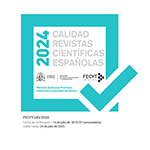The leisure construction in adolescents and this influence for development of criminal careers
Abstract
The construction of leisure activities affects directly in the positive development of the teens, enable them to a healthy socialization of their lives. The complexity of the activity design and leisure programs requires a big effort by the different agents; so the public administrations, parents, professionals, teens and the management of these programs have to coordinate their efforts to develop a balanced space for the leisure activities. The activities that focus on the supervised leisure allow to grow positively. The alarm arises when the leisure spaces change without any notice into dangerous risk spaces. In this sense, this article will attempt to explain how the teen build their behaviours, leisure situations and how they are capable of generate incorrect dynamics that contribute in the negative development of the teen. Furthermore, this article will try to discover how to define public practices and to see how youngsters build their participation strategies and educational promotion to play constructive playgrounds. All is done with the intention to provide with the right information to successful professionals to be able to diagnose effectively. At this point, this article shows how to enjoy leisure influences the development of crime. A more leisure deviated risk of incurring more crimes. This strategy is developed methodological complementarity, where quantitative data records are extracted from 281 adolescents in conflict with the law of the city of Valencia and linked to three criminal trajectories generated from the multivariate analysis. The article is completed with privileged informant interviews everyday spaces shared with adolescents in conflict with the law, since the legal field, educational, police or social intervention. Among the most important findings, we found that leisure is important rehabilitative tool for empowerment of adolescents.
Downloads
Article download
License
In order to support the global exchange of knowledge, the journal Cuadernos de Trabajo Social is allowing unrestricted access to its content as from its publication in this electronic edition, and as such it is an open-access journal. The originals published in this journal are the property of the Complutense University of Madrid and any reproduction thereof in full or in part must cite the source. All content is distributed under a Creative Commons Attribution 4.0 use and distribution licence (CC BY 4.0). This circumstance must be expressly stated in these terms where necessary. You can view the summary and the complete legal text of the licence.









